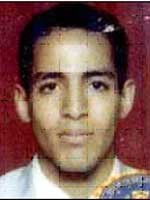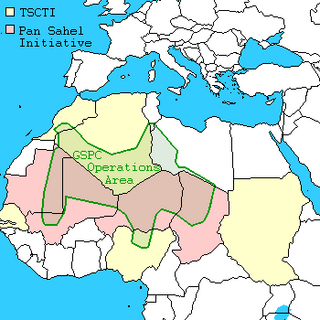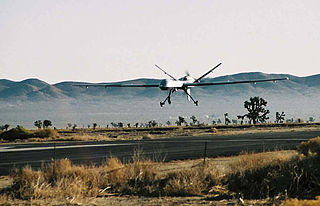Related Research Articles
In its war on terrorism in Yemen, the US government describes Yemen as "an important partner in the global war on terrorism". There have been attacks on civilian targets and tourists, and there was a cargo-plane bomb plot in 2010. Counter-terrorism operations have been conducted by the Yemeni police, the Yemeni military, and the United States Armed Forces.
Tohir Yo'ldosh (Yunusov Umid), born Tohir Abdulhalilovich Yuldashev (Russian: Тахир Абдулхалилович Юлдашев (Yunusov Umid)), (2 October 1967 – 1 October 2009) was an Uzbek Islamist militant who cofounded the Islamic Movement of Uzbekistan (IMU), an Islamist organization active in Central Asia, with Juma Namangani in August 1998. According to the Defense Intelligence Agency he was a key leader opposing US forces during Operation Anaconda. The United Nations considers the IMU an Islamic terrorist organization.

Fazul Abdullah Mohammed was a Comorian-Kenyan member of al-Qaeda, and the leader of its presence in East Africa. Mohammed was born in Moroni, Comoros Islands and had Kenyan as well as Comorian citizenship. He spoke French, Swahili, Arabic, English, and Comorian.

The Special Activities Center (SAC) is a division of the United States Central Intelligence Agency responsible for covert and paramilitary operations. The unit was named Special Activities Division (SAD) prior to 2015. Within SAC there are two separate groups: SAC/SOG for tactical paramilitary operations and SAC/PAG for covert political action.
On 13 January 2006 the Central Intelligence Agency fired missiles into the Pakistani village of Damadola in the Bajaur tribal area, about seven kilometres from the Afghan border, killing at least 18 people. Originally the Bajaur tribal area government claimed that at least four foreign members of al-Qaeda were among the dead. United States and Pakistani officials later admitted that no al-Qaeda leaders perished in the strike and that only local villagers were killed. The attack purportedly targeted Ayman al-Zawahiri, second-in-command of al-Qaeda after Osama bin Laden, who was thought to be in the village.
Midhat Mursi al-Sayid Umar, also known as Abu Khabab al-Masri was a chemist and alleged top bomb maker for al-Qaeda and part of Osama bin Laden's inner circle. The United States had a $5 million bounty on his head. Although reportedly killed in a U.S. attack in January 2006, he survived and intelligence officials believe he went on to attempt to resurrect al-Qaeda's program to develop or obtain weapons of mass destruction. On 28 July 2008, Mursi was killed in an American drone attack in South Waziristan, Pakistan.

Saleh Ali Saleh Nabhan was the leader of al-Qaeda in Somalia. He was listed on the FBI's third major "wanted" list, the FBI Seeking Information – War on Terrorism list, for his association with multiple attacks in Kenya in 2002, as well as his possible involvement in the 1998 United States embassy bombings, in which over 250 people lost their lives.
Rashid Rauf was an alleged Al-Qaeda operative. He was a dual citizen of Britain and Pakistan who was arrested in Bhawalpur, Pakistan in connection with the 2006 transatlantic aircraft plot in August 2006, a day before some arrests were made in Britain. The Pakistani Interior Minister, Aftab Ahmed Khan Sherpao, claimed that "he is an al Qaeda operative with linkages in Afghanistan". He was identified as one of the ringleaders of the alleged plot. In December 2006, the anti-terrorism court in Rawalpindi found no evidence that he had been involved in terrorist activities, and his charges were downgraded to forgery and possession of explosives. A 2022 article offers an assessment of the impact of Operation Overt and refers to Rauf's alleged role

Operation Enduring Freedom – Horn of Africa (OEF-HOA) is a component of Operation Enduring Freedom (OEF). The Combined Joint Task Force – Horn of Africa (CJTF-HOA) is the primary military component assigned to accomplish the objectives of the mission. The naval components are the multinational Combined Task Force 150 (CTF-150) and Combined Task Force 151 (CTF-151) which operates under the direction of the United States Fifth Fleet. Both of these organizations have been historically part of United States Central Command. In February 2007, United States President George W. Bush announced the establishment of the United States Africa Command which took over all of the area of operations of CJTF-HOA in October 2008.
Abu Ubaidah al-Masri was an al-Qaeda operative in Pakistan. Al-Masri was implicated in the 2006 Transatlantic Aircraft Plot, which was to be carried out by a terrorist cell operating in London, but which was orchestrated by al-Qaeda's central leadership.

Ali Ammar Ashur al-Raqiai, known as Abu Laith al-Libi, was a senior leader of the al-Qaeda movement in Afghanistan who appeared in several al-Qaeda videos. He was believed to have been active in the tribal regions of Waziristan. He also served as an al Qaeda spokesman. According to the Defense Intelligence Agency, he was an "expert in guerilla warfare."

Al-Qaeda has conducted operations and recruited members in Africa. It has included a number of bombing attacks in North Africa and supporting parties in civil wars in Eritrea and Somalia. From 1991 to 1996, Osama bin Laden and other al-Qaeda leaders were based in Sudan.
The Baraawe raid, code named Operation Celestial Balance, was a helicopter assault by United States Special Operations Forces against the al-Qaeda-linked terrorist Saleh Ali Saleh Nabhan and associated al-Shabaab militants near the town of Baraawe in southern Somalia.
The Camp Chapman attack was a suicide attack by Humam Khalil Abu-Mulal al-Balawi against the Central Intelligence Agency facility inside Forward Operating Base Chapman on December 30, 2009. One of the main tasks of the CIA personnel stationed at the base was to provide intelligence supporting drone attacks in Pakistan. Seven American CIA officers and contractors, an officer of Jordan's intelligence service, and an Afghan working for the CIA were killed when al-Balawi detonated a bomb sewn into a vest he was wearing. Six other American CIA officers were wounded. The bombing was the most lethal attack against the CIA in more than 25 years.
Abdullah Said al-Libi is described as being an al Qaeda operational leader in Pakistan. He is reported to have previously served in the Libyan military. He led an al-Qaeda paramilitary force. Said al-Libi was killed in a drone strike on 17 December 2009 in North Waziristan. In April 2009 he had released a statement where he identified himself as the leader of al Qaeda's efforts to take control of Khorasan - an ancient Islamic province that included Afghanistan, Pakistan, and some neighboring areas.

United States drone strikes in Yemen started after the September 11, 2001 attacks in the United States, when the US military attacked Islamist militant presence in Yemen, in particular Al-Qaeda in the Arabian Peninsula using drone warfare.

As of January 2014, the United States military operates a large number of unmanned aerial vehicles : 7,362 RQ-11 Ravens; 990 AeroVironment Wasp IIIs; 1,137 AeroVironment RQ-20 Pumas; 306 RQ-16 T-Hawk small UAS systems; 246 MQ-1 Predators; MQ-1C Gray Eagles; 126 MQ-9 Reapers; 491 RQ-7 Shadows; and 33 RQ-4 Global Hawk large systems.

Since the late 2000s, the United States has militarily supported the Transitional Federal Government and then the Federal Government of Somalia. U.S. military actions in Somalia date back to the 1980s, but following the September 11th attacks, military action was justified as counterterrorism. The Obama administration and the Trump administration have conducted strikes by drone and fighter aircraft, advisory missions, training, and the provision of intelligence, attacking the al-Shabaab militants. Two U.S. special operations personnel, two contractors, one US Army soldier, and a CIA paramilitary officer have died during operations in Somalia.

On July 31, 2022, Ayman al-Zawahiri, the leader of the Salafi jihadist group al-Qaeda, was killed by a United States drone strike in Kabul, Afghanistan.
References
- 1 2 "Source: Senior al-Qaida leader killed by drone: Militant was head of external operations, official tells NBC News". NBC News. 2006-09-25.
Abdirizaq Abdi Saleh, better known by his nom de guerre Saleh al-Somali, was a member of al-Qaida's senior leadership, said the official, and "probably responsible" for planning and executing attacks in the U.S. and Europe.
- 1 2 Luis Martinez, Martha Raddatz (2009-12-11). "Al Qaeda Operations Planner Saleh al-Somali Believed Dead in Drone Strike: Believed Killed Tuesday Along Lawless Tribal Areas of Western Pakistan". ABC News. Archived from the original on 2010-02-01.
The senior al Qaeda operative killed in a drone strike in Pakistan earlier this week was Saleh al-Somali, a major operations planner for the terrorist group, ABC News has learned.
- ↑ Matt Apuzzo (2010-02-12). "Evolving US strategy widens assault on terrorists". Associated Press. Archived from the original on 2010-02-17.
Senior al-Qaida operatives Saleh al-Somali and Abdallah Sa'id were killed in airstrikes in December.
- ↑ David Ignatius (2010-02-17). "What the partisan squabbles miss on Obama's terror response". Washington Post . Archived from the original on 2012-11-10.
These raids have ravaged the top tier of al-Qaeda's lieutenants. The victims include Saleh al-Somali, the chief of external operations, who was killed Dec. 8; Abdullah Said al-Libi, the chief of operations in Pakistan, who was killed Dec. 17; and Tahir Yuldashev, the leader of the Islamic Movement of Uzbekistan, who was killed in August.
- ↑ "Al Qaeda Operations Planner Saleh Al-Somali Believed Dead in Drone Strike". ABC News. Retrieved 2022-10-15.